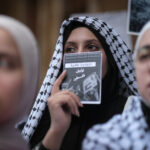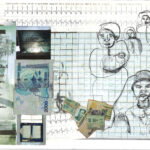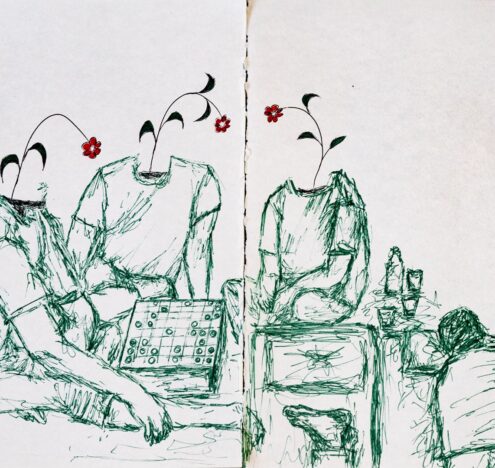In the heart of Gaza City, al-Shifa Hospital stands as a harrowing testament to the toll of relentless conflict. Here, the echoes of war are not confined to the distant rumble of airstrikes; they reverberate through the anguished cries that fill its corridors and the despair-laden air clinging to its overburdened walls. As I walk through the hospital’s doors, the gravitas of human suffering grips me. As a journalist, I have the impossible task of transcribing a tragedy into words that the world can understand. As a human, I am overwhelmed with the cost of this conflict measured in the currency of pain.
Each step I took within al-Shifa Hospital was a somber journey through scenes that verge on the apocalyptic. There are bodies, too many to count, some small enough that the white shrouds enveloping them leave room for nothing but the haunting certainty of youth extinguished. I asked a naive question about why some bags were heavier and bigger than the rest. The chilling response was that these disturbing parcels contain remnants of lives so brutally torn apart that identification becomes a process of piecing together the indistinguishable.
The airstrikes’ sounds are a prelude to the macabre wails of ambulances that stream into the hospital. Each vehicle carries the burden of human suffering with frantic urgency. Doctors, etched with the fatigue of the relentless onslaught, move with mechanical precision: triaging, treating, and sometimes, with a look that betrays their helplessness, retreating. The math of crisis care is merciless — the necessity to discharge those half-healed to make room for the freshly wounded.
The hospital has grown beyond its original purpose and is now a haven for those fleeing the unyielding airstrikes, they hope and assume it is a safer place. Thousands of families nest in the spaces of the structure — the nooks, the hallways, and the stairwells. Each family’s presence is a story of displacement, of homes turned to rubble, of lives fractured by war. In the dim light, the glow of their eyes tells tales of death, and their bodies carry scars of survival.
A Crucible of Grief and Courage
Attempting to thread through the dense tapestry of human bodies that carpet the floors, I sought out voices to imbue this feature with the visceral truths of those ensnared by war. The survivors’ accounts are a crucible of grief and courage. A father, his gaze hollowed by loss, speaks of the momentary brightness of his child’s smile, now extinguished. A mother recounts the shockwave that tore her family apart, leaving her to gather the fragments of her existence in the aftermath.
The latest report from the Ministry of Health in Gaza paints a somber picture: 24 incidents have been labeled as massacres in the last day, with a death toll reaching 243. Since the start of hostilities on October 7, the Ministry of Health has reported that a staggering 9,770 lives have been lost, including 4,008 children and 2,550 women. The wounded number at 24,808, with 2,260 individuals still missing, many feared buried beneath the rubble. Among these, 1,270 are children whose fates remain uncertain, their families clinging to the fragile tendrils of hope.
The devastation has not spared the healthcare system itself. In the chaos, 175 health workers have perished, 31 ambulances have been destroyed, and 110 health institutions, including 16 hospitals and 32 primary care centers, have been disrupted or damaged, in part due to crippling fuel shortages.
As a journalist, I have the impossible task of transcribing a tragedy into words that the world can understand. As a human, I am overwhelmed with the cost of this conflict measured in the currency of pain.
The corridors of al-Najjar, another hospital in Gaza resonate with the echoes of what once was. In the heart of Rafah City, the very air is heavy with loss, each breath a reminder of the fragility of life. It is within these walls that Dr. Ismail Omar, 28, a recent graduate, finds himself at the epicenter of a relentless storm — the storm of conflict that knows no bounds.
“I remember the first day of my call,” Dr. Omar’s voice is steady, but his eyes betray the chaos he has witnessed. “The bodies… they extended from the morgue to the hospital gates. Hundreds of lives, extinguished in moments, including the smallest of us — children and women.” The pause that follows is not one of hesitation, but of an overwhelming grief that words cannot encapsulate.
A Threnody of Wails
As Israeli airstrikes puncture the relative calm, each bombing heralds a wave of fresh agony. “There’s no red line that hasn’t been crossed,” Dr. Omar remarks with a mix of resignation and defiance. Hospitals, schools, and even bakeries — places that once symbolized life and sustenance — have become targets, leaving a trail of broken bodies and shattered spirits.
For Dr. Omar, the hospital — a place meant for healing — has morphed into an antechamber of death. The emergency room, where he once envisioned saving lives, now often serves as a temporary tomb for those who couldn’t be reached in time. “You’re left to triage amid the threnody of wails, deciding who might have a chance when chances are so slim,” he says, the weight of such decisions etched into the furrows of his brow.
But even amid such relentless despair, there are moments — a pulse in the silence — that remind him why he donned the white coat. On a day like any other in this new reality, an ambulance screeched to a halt; its doors opened to reveal a scene more akin to a battlefield than a vehicle of rescue. “The inside was like a blood tide; entire families were wiped out in an instant,” Dr. Omar recalls, the memory vivid as if imprinted on his very soul. With hands that both heal and search for life, he found a flicker of vitality — a baby boy, no older than a year, breathing quietly beneath the lifeless embrace of his family.
“It was both a miracle and a curse to find him there — alive yet orphaned in the blink of an eye,” Dr. Omar concluded.





















